Chang Hsiao-yen, 46, holds a bachelor's degree in foreign languages from Soochow University and a master's degree in political science from Georgetown University in Washington, D.C. He began serving in the Ministry of Foreign Affairs in 1967, where he worked his way up from entry-level case officer to vice minister. "He did it step by step, without jumping rank," one seasoned diplomatic veteran comments.
Calm, hard working, realistic, and bold in vision are the adjectives used most to describe him by diplomatic officers. Widely read and tenacious of memory, Chang is highly articulate, engaging in personality, and fluent in English, French, and several dialects of Chinese. Daring to speak up and stressing the importance of communication are two of his other characteristics.
In the two interviews that Sinorama held with him, Vice Minister Chang discussed in depth the diplomatic challenges facing the R.O.C. today, its flexible methods, and its constant principles.
Q: At this year's meeting of the Asian Development Bank our delegation covered up the "Taipei, China" on their nametags and put up signs saying, "under protest." What effect do you think this will have?
A: We basically don't accept the name "Taipei, China," but in consideration of the nation's realistic interests, we felt we ought to participate. In the past we used to take part if we accepted the name and stay away if we didn't. Now we're taking part even though we don't accept the name. We're hoping that because of our protest the bank will come up with a more appropriate name and arrangement.
Q: At this year's meeting of the Asian Development Bank the R.O.C. announced its intention to make funds available to the bank for loans. Some people believe that we should try to win the favor of Third World countries by making loans to them directly before trying to win the support of the bank. What is your opinion?
A: Winning the support of countries that have diplomatic relations with the Chinese Communists is not something we can accomplish by economic power alone. Loans can be of help to a certain degree of course, but there's a limit.
That's why the object of our efforts is winning support for us from the individual member countries of the ADB on the one hand and from the bank itself on the other.
Q: What principles should we have in participating in international activities and organizations in the future?
A: Active participation is the main principle. If the activity is held in a Communist country, but the host organization is not Communist, then we'll go ahead and participate.
Q: What if the activity has shades of being official?
A: It depends on whether we're a member country or not. If we are, then we won't stay away without good reason. But if an international activity is held by a Communist country, it's hard to say we'll definitely take part. It depends on the situation at the time.
Q: The next annual meeting of the Asian Development Bank will take place on the mainland. Will we attend?
A: This is a problem we're still studying. Based on current principles, it would be hard for us to go. The probability is rather low.
Q: Please make an appraisal of the R.O.C.'s present foreign relations.
A: Our foreign relations fall into two categories; formal diplomatic relations, which we maintain with 22 countries, and substantive relations, which we maintain with more than 130 countries.
In talking about the current situation, you can't help looking at the changes that have occurred in our international position over the past forty years. In 1949, the year the government withdrew to Taiwan, 47 countries recognized us, and the number fell to 39 the next year. In 1952 we strengthened our relations with the U.S., and we concentrated over the next two decades on cultivating relations with the newly independent nations. The number of countries that recognized us grew to 53 in 1960 and to 69 in 1970.
But by 1971 the U.S. attitude toward us had changed, and that affected the stands of many other countries. Only 24 countries still recognized us when the U.S. broke relations in 1979. So the attitude of the U.S. has a big effect on our foreign relations.
The attitude of the Chinese Communists toward us has never changed. They have constantly sought to expel and isolate us, hoping to wipe us out as quickly as possible.
Q: Since our international situation is so difficult, some argue, why shouldn't we try other methods like "dual recognition," "Taiwan independence," or "one country two systems" in the hope of achieving a diplomatic breakthrough?
A: If you work in foreign affairs, you've got to recognize political realities. In my view, these other methods are all impracticable. Why? It's all tied up with the attitude of the Communists. The major reason why any country breaks or establishes relations with us is their relations with the Communists. The Communists demand that anyone who wants to establish relations with them must break ties with us. That attitude has never changed.
Q: Some people say the U.N. offered us a chance for "two Chinas." Why did we pass it up?
A: The idea of two Chinas conflicts head-on with our national policy, so we couldn't agree. And in fact the Communists wouldn't have agreed either, any more than we.
The situation in Germany is different. Many countries recognize only the East or the West, and many others recognize both. The main reason it works there is that East and West Germany recognize each other themselves.
Q: What about "one country two systems"?
A: When the Communists say "one country two systems" the one country they mean is they--I call it "hegemonism." They want to use the Hong Kong formula on us, but we're completely different from Hong Kong. We're a nation. What nation would give up its right to exist? The Communists have all kinds of suggestions, but they all come down to taking down our flag and giving up our name. Our international position would be even lower.
Taiwan independence won't work either. Any country that establishes relations with the Chinese Communists has to accept the principle that Taiwan is a part of China, so to recognize an independent Taiwan they would have to break ties with the mainland. If they wanted to break ties with the mainland, they wouldn't have to recognize Taiwan--they could recognize the R.O.C.
Q: The Communists and we may both insist that there is only one China, but the fact is that more countries recognize them than us. If we continue to insist that we represent China, what will be the result?
A: Frankly speaking, we have no other choices than insistence now. Any other approach would only be worse. Insistence has its difficulties, of course. A hidden worry, naturally, is that our allies will become fewer and fewer.
On the other hand, the international situation is not fixed and neither are the relations other countries have with the Chinese Communists. That's why we're working hard to be friends with some of the newly independent countries and why we're striving to upgrade the substantive relations that we maintain with many countries that recognize the Communists into formal diplomatic relations.
Q: A Mainland Chinese student at Harvard University recently wrote an article saying that Taiwan's policy of the Three No's is not active enough and should be changed. What is your view?
A: The Three No's--no contacts, no negotiations, and no compromises--sound negative, but they actually refer only to contacts, negotiations, and compromises at the government-to-government level. The principle of the Three No's won't change on the political level, but it can be quite flexible on the private level, where there are actually many contacts already.
Q: The Ministry of Foreign Affairs seems rather remote and inaccessible to the general public among the various government agencies. How can this situation be improved?
A: We've been going out often to schools and organizations recently to give talks so that we can help citizens understand our nation's true situation and what we're doing at the ministry. I think that citizens have a much better understanding of the ministry now than they used to.
Q: What things have you found most satisfying and frustrating in your work?
A: The break in relations with the U.S. was the biggest disappointment. To tell the truth, there are not many things that make you happy in diplomatic work and there are a lot of chances for people to criticize. I knew that this kind of work wouldn't be easy before I joined the ministry, and I've found even more problems since. But I'm optimistic. I like hard jobs, the tougher the better.
[Picture Caption]
Vice Minister and Mrs. Chang Hsiao-yen drink a toast to Ambassador H. E. Oscar Felix Peguero Hermida of Dominica and his wife at a farewell party for the ambassador. In the center of the picture is Chu Fu-sung, formerly R.O.C. minister of foreign affairs. (photo courtesy of the Ministry of Foreign Affairs)
Jeb Bush, director of the Florida Department of Commerce and son of the U.S. vice president, visited the R.O.C. earlier this year and talked with Vice Minister Chang in the Ministry of Foreign Affairs. (photo courtesy of the Ministry of Foreign Affairs)
Vice Minister Chang and family.
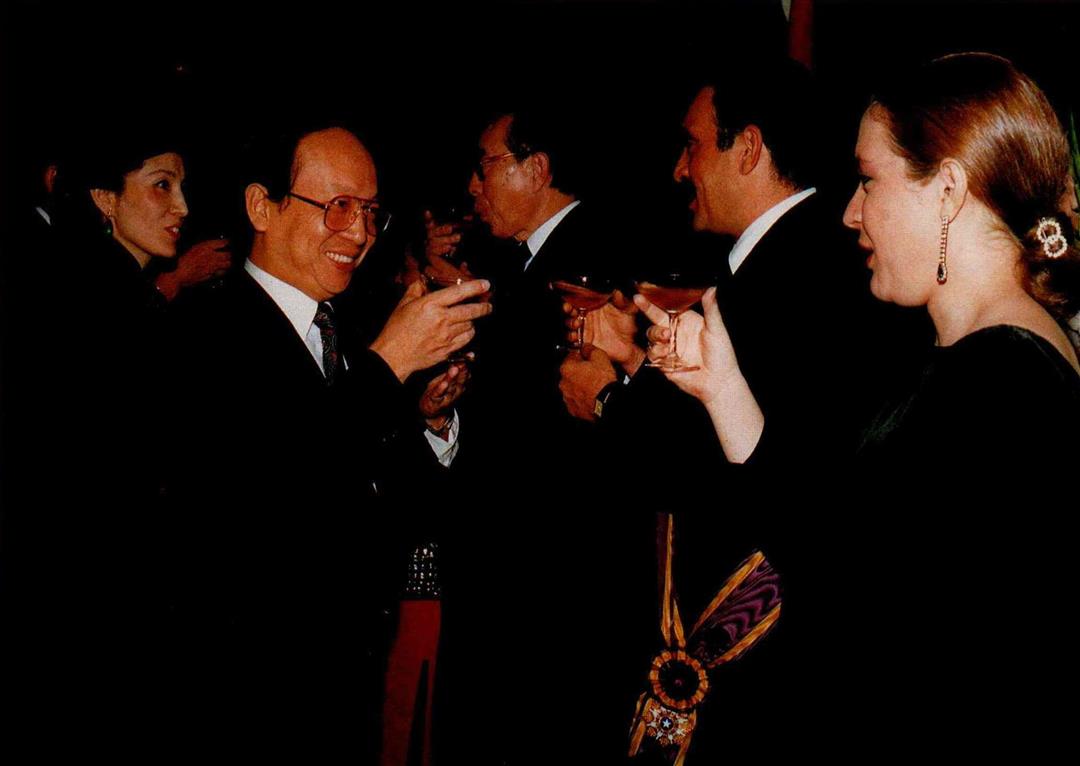
Vice Minister and Mrs. Chang Hsiao-yen drink a toast to Ambassador H. E. Oscar Felix Peguero Hermida of Dominica and his wife at a farewell party for the ambassador. In the center of the picture is Chu Fu-sung, formerly R.O.C. minister of foreign affairs. (photo courtesy of the Ministry of Foreign Affairs)
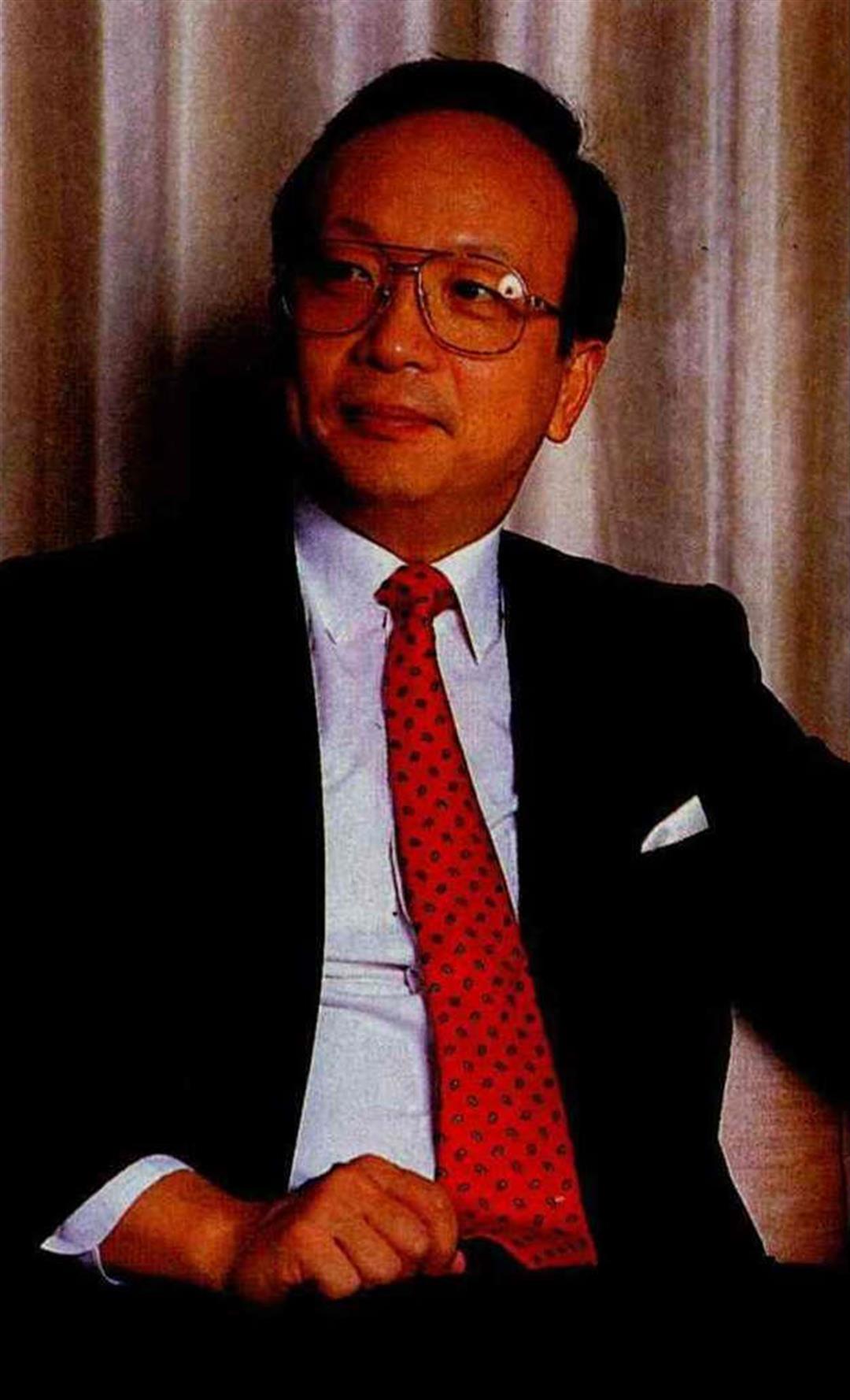
Vice Minister and Mrs. Chang Hsiao-yen.
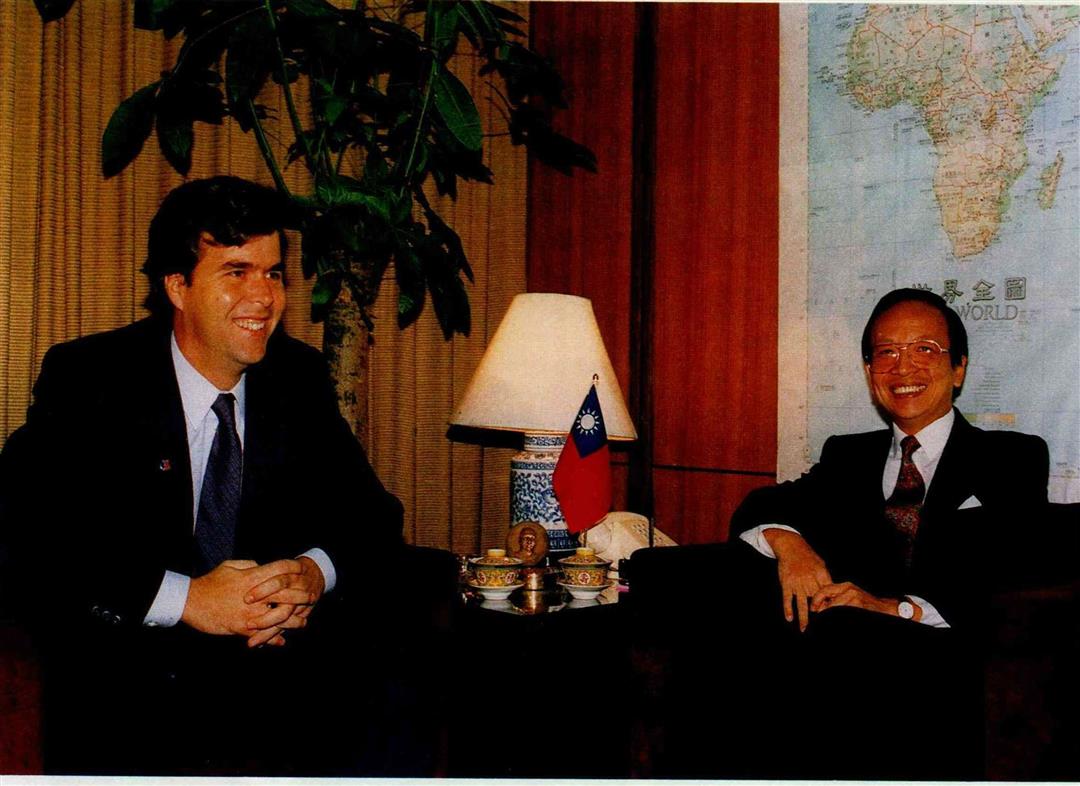
Jeb Bush, director of the Florida Department of Commerce and son of the U.S. vice president, visited the R.O.C. earlier this year and talked with Vice Minister Chang in the Ministry of Foreign Affairs. (photo courtesy of the Ministry of Foreign Affairs)
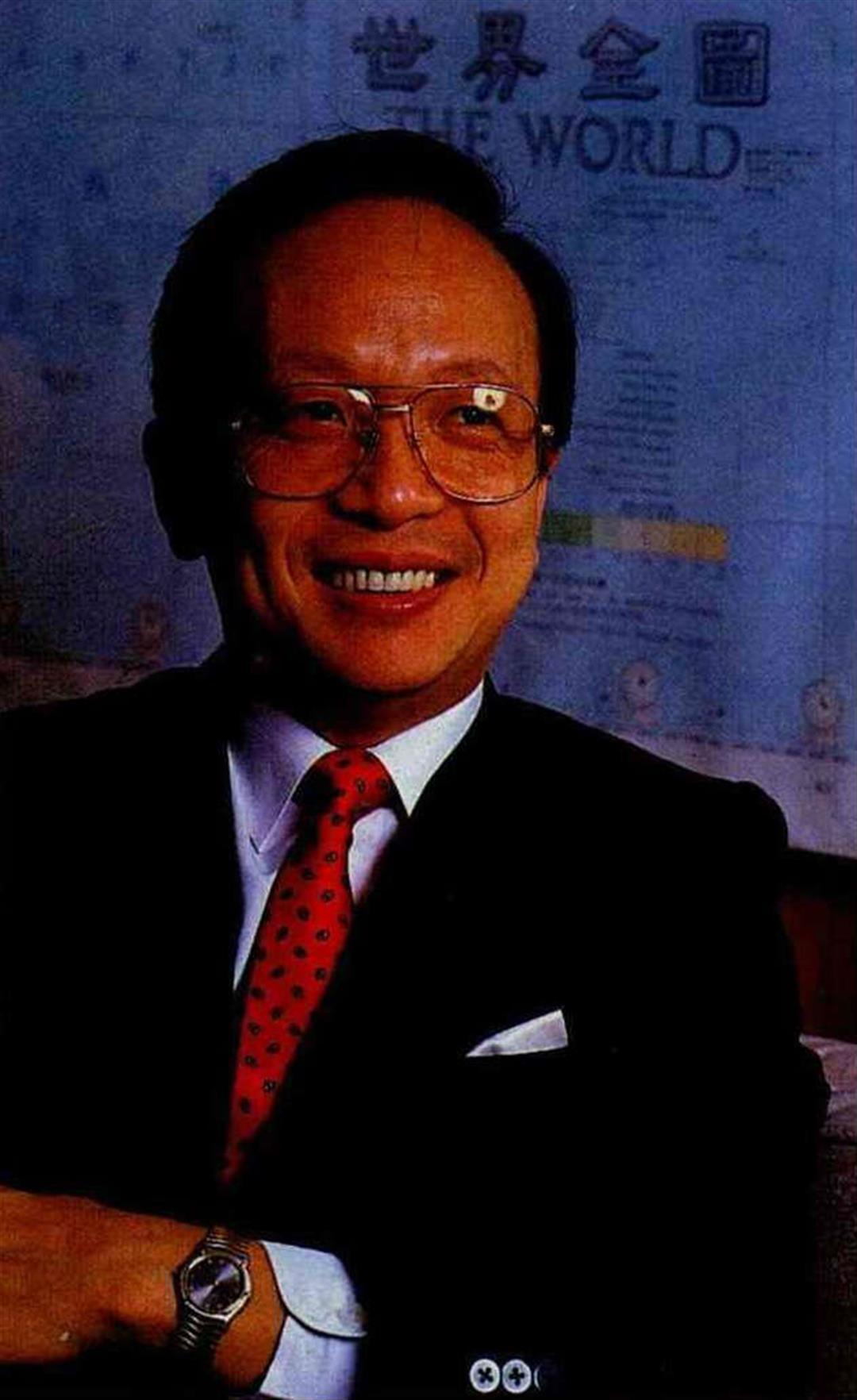
Vice Minister and Mrs. Chang Hsiao-yen.
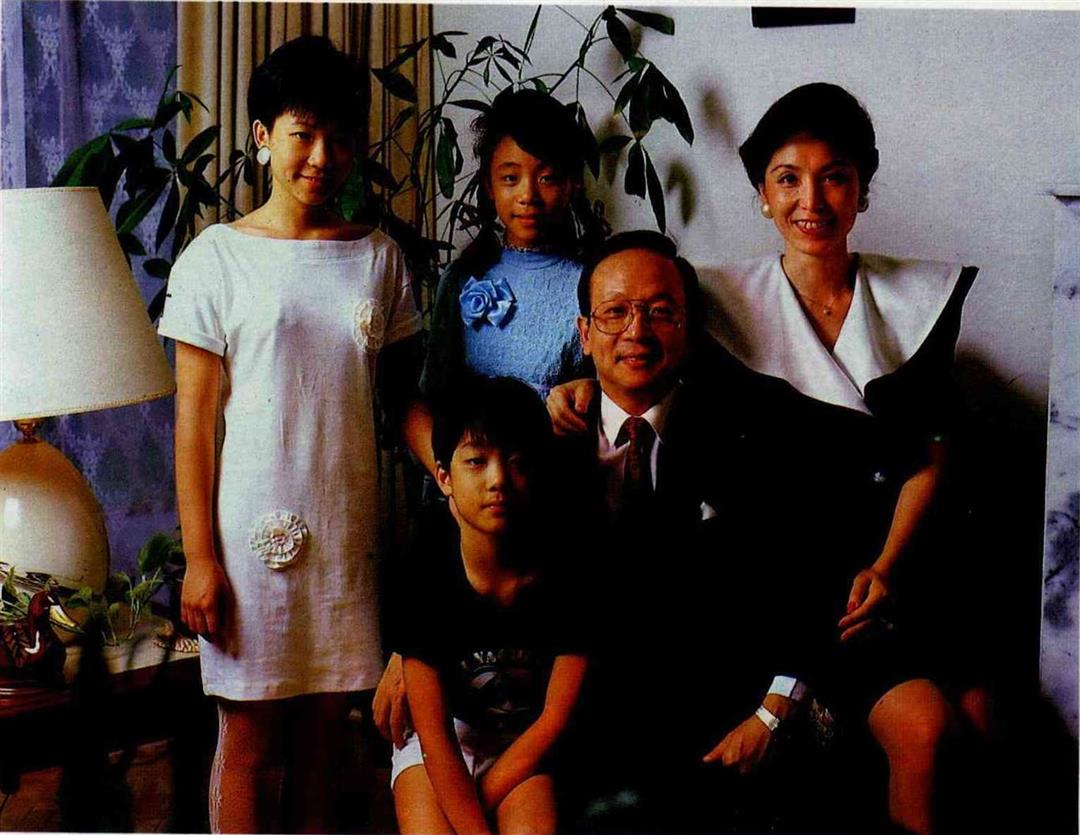
Vice Minister Chang and family.